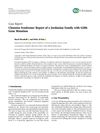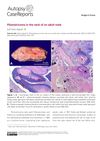 1 citations,
September 2013 in “Mayo Clinic Proceedings”
1 citations,
September 2013 in “Mayo Clinic Proceedings” A woman's hair loss was treated successfully with iron supplements for her iron deficiency.
 1 citations,
January 2012 in “International Journal of Trichology”
1 citations,
January 2012 in “International Journal of Trichology” Hair India 2012 was a successful international event focused on combating fake trichology practices and discussing various hair health topics.
 1 citations,
February 2009 in “Clinical and Experimental Dermatology”
1 citations,
February 2009 in “Clinical and Experimental Dermatology” Hormone-replacement therapy improved a woman's skin condition known as lymphomatoid papulosis.
 1 citations,
July 1976 in “Archives of Dermatology”
1 citations,
July 1976 in “Archives of Dermatology” Some women experienced hair loss after stopping chorionic gonadotropin injections and a low-calorie diet.
 April 2024 in “Proceedings”
April 2024 in “Proceedings” People with alopecia areata often have lower iron levels than healthy people.

Doctors should consider Netherton syndrome in patients with chronic skin and hair issues to avoid misdiagnosis.
 March 2024 in “medRxiv (Cold Spring Harbor Laboratory)”
March 2024 in “medRxiv (Cold Spring Harbor Laboratory)” Recent selection on immune response genes was identified across seven ethnicities.
 March 2024 in “Frontiers in endocrinology”
March 2024 in “Frontiers in endocrinology” A new MTX2 gene mutation caused a severe genetic disorder in a young Chinese girl.
 January 2024 in “Dermatology practical & conceptual”
January 2024 in “Dermatology practical & conceptual” Lymecycline may help with Frontal Fibrosing Alopecia but needs more research.
 January 2024 in “Archives of Endocrinology and Metabolism”
January 2024 in “Archives of Endocrinology and Metabolism” A new gene mutation causes insulin resistance in a girl and her mother.
 December 2023 in “Curēus”
December 2023 in “Curēus” Surgical removal of a scalp keratoacanthoma is effective and prevents recurrence, but hair may not regrow.
 December 2023 in “Oxford medical case reports”
December 2023 in “Oxford medical case reports” Standard treatment for congenital erythropoietic porphyria was ineffective over five years.
 October 2023 in “Dermatology practical & conceptual”
October 2023 in “Dermatology practical & conceptual” Folliculitis Decalvans and Frontal Fibrosing Alopecia can coexist in people with darker skin, showing features of both conditions.

A rare case of a woman having both lichen planus pigmentosus and classic lichen planopilaris at the same time.
 October 2023 in “Case reports in dermatological medicine”
October 2023 in “Case reports in dermatological medicine” A Jordanian family with Clouston syndrome has a common GJB6 gene mutation.
 October 2023 in “International Journal of Science and Research (IJSR)”
October 2023 in “International Journal of Science and Research (IJSR)” Early diagnosis of GLPLS is crucial to prevent complications, but scarring alopecia is irreversible.
 September 2023 in “Reproductive health of woman”
September 2023 in “Reproductive health of woman” PCOS is common, affects fertility, and requires personalized treatment to manage symptoms and health risks.

Non-invasive methods can effectively diagnose and manage alopecia areata.
 March 2023 in “Journal of clinical review & case reports”
March 2023 in “Journal of clinical review & case reports” Frontal Fibrosing Alopecia mainly affects postmenopausal Mexican women, requiring early detection to prevent permanent hair loss.

Understanding genetics is crucial for treating heart and skin diseases.
 March 2022 in “Nepal Journal of Dermatology Venereology & Leprology”
March 2022 in “Nepal Journal of Dermatology Venereology & Leprology” Methotrexate with steroids is slightly more effective than azathioprine with steroids for treating severe alopecia areata.
 January 2022 in “International journal of zoology and animal biology”
January 2022 in “International journal of zoology and animal biology” Dogs with dermatomyositis, especially Collies and Shetland Sheepdogs, need better treatments for their skin and muscle inflammation.
 January 2022 in “Autopsy and Case Reports”
January 2022 in “Autopsy and Case Reports” A man had a non-cancerous neck tumor related to hair follicles removed with no return of the tumor.
 August 2021 in “Benha Journal of Applied Sciences”
August 2021 in “Benha Journal of Applied Sciences” Stress can trigger and worsen vitiligo.
 June 2021 in “International journal of research in dermatology”
June 2021 in “International journal of research in dermatology” A boy and his father with hereditary hypotrichosis simplex were treated for hair loss, but the treatment result is unknown.
 May 2021 in “Dermatopathology”
May 2021 in “Dermatopathology” The review emphasizes the need to recognize skin conditions that affect hair follicles and sweat glands to avoid misdiagnosis.
 December 2020 in “bioRxiv (Cold Spring Harbor Laboratory)”
December 2020 in “bioRxiv (Cold Spring Harbor Laboratory)” Stress can cause a type of hair loss in mice lacking the CCHCR1 gene.
 November 2020 in “International journal of contemporary pediatrics”
November 2020 in “International journal of contemporary pediatrics” Two siblings had a rare immune disorder caused by a FOXN1 gene mutation.
 June 2020 in “Annals of the Rheumatic Diseases”
June 2020 in “Annals of the Rheumatic Diseases” Patients with Systemic Sclerosis have much higher levels of GDF-15, which could help predict organ involvement and guide treatment.
 September 2019 in “The journal of investigative dermatology/Journal of investigative dermatology”
September 2019 in “The journal of investigative dermatology/Journal of investigative dermatology” Not having enough cystatin M/E protein causes less hair growth and dry skin.






























